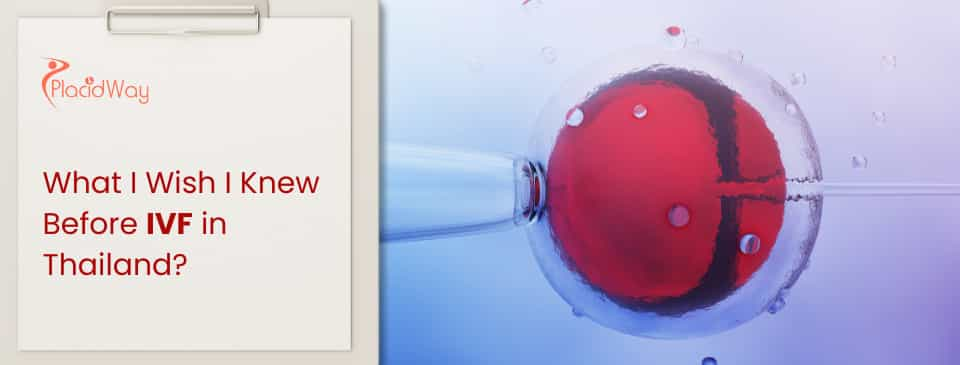Why Choose Thailand for IVF?

For many couples struggling with infertility, In Vitro Fertilization (IVF) offers a powerful path to parenthood. As a global hub for medical tourism, Thailand has become a highly sought-after destination for IVF due to its combination of advanced technology, lower costs, and experienced medical professionals. However, undergoing a complex medical procedure in a foreign country requires careful planning.
This guide is designed to provide you with the essential tips and insights that people who have completed their IVF journey in Thailand wish they knew before they started. We'll cover everything from financial planning and navigating legal requirements to preparing for the emotional and physical aspects of treatment. By understanding these key details, you can approach your IVF journey with confidence and a clear plan, increasing your chances of a successful outcome and a positive experience.
What is the cost of IVF in Thailand?
The financial savings are one of the most compelling reasons to choose Thailand for IVF. While a single IVF cycle can cost upwards of $15,000 to $20,000 in many Western nations, the same procedure in Thailand is often a fraction of that price. The lower operational costs and a favorable exchange rate allow clinics to offer state-of-the-art care at a more accessible price point. However, it's important to clarify what is included in the "basic" package.
The quoted price usually covers the main components of a cycle, such as ovarian stimulation, egg retrieval, fertilization, and embryo transfer. However, additional costs can arise from:
- Diagnostics: Initial blood tests, ultrasounds, and semen analysis.
- Medication: The cost of fertility drugs for ovarian stimulation can vary significantly based on the dosage required.
- Additional Procedures: Techniques like ICSI (Intracytoplasmic Sperm Injection), PGT (Preimplantation Genetic Testing), or embryo freezing will increase the total cost.
- Multiple Cycles: Many couples need more than one cycle to achieve a successful pregnancy, which will add to your overall financial commitment.
Always ask for a detailed, itemized quote that breaks down all potential costs to avoid any surprises.
What are the IVF success rates in Thailand?
One of the most important factors for anyone considering IVF is the chance of success. Thailand's leading clinics use advanced technology and have experienced specialists, which contributes to their high success rates. The rates can be broken down further by age:
| Age | Average Success Rate |
|---|---|
| Under 35 | 45-55% |
| 35-37 | 35-45% |
| 38-40 | 25-35% |
| Over 40 | 15-25% |
It's important to look at a clinic’s specific success rates for your age group and infertility diagnosis. Don't base your decision solely on a clinic's overall success rate, as this can be influenced by the age and health of their patient demographic. A reputable clinic will be transparent about their statistics and will provide a personalized estimate based on your medical history.
Do I need to be married to get IVF in Thailand?
This is one of the most critical legal considerations. Unlike some countries that are more lenient, Thai law is clear on who can access IVF services. This means single women, unmarried couples, or same-sex couples are generally not eligible for standard IVF treatment. If you are a married couple, you will need to provide a legal marriage certificate. It is essential to have this document translated and certified, as clinics will require it for their official records before you can start a cycle. Always verify the specific documentation requirements with your chosen clinic well in advance of your trip.
How do I choose the right IVF clinic in Thailand?
Selecting the right clinic is the single most important decision you'll make. A good clinic should meet the following criteria:
- Credentials and Accreditations: Look for clinics with international accreditations like JCI (Joint Commission International) or those affiliated with professional organizations.
- Surgeon and Team Expertise: Research the doctor's experience, specifically with your type of infertility. The embryology lab staff should also be highly experienced, as their work is crucial to the success of the cycle.
- Technology: Ensure the clinic uses modern equipment, such as advanced incubators and PGT labs, which can improve success rates.
- Communication: The clinic's staff and coordinators should be fluent in English and provide clear, timely communication. A strong patient support system is essential, especially from afar.
- Reviews and Testimonials: Read patient stories and reviews on independent forums and social media groups to get an honest perspective on their experiences.
What is the typical IVF timeline in Thailand?
The IVF process is not a quick one, and requires a dedicated stay. The typical timeline is as follows:
- Initial Consultation and Testing: This can often be done remotely with your local doctor, who can send the results to the clinic in Thailand.
- Ovarian Stimulation (8-14 days): The female partner will be in Thailand for this period, receiving daily hormone injections to stimulate egg production. You will have frequent monitoring appointments with ultrasounds and blood tests.
- Egg Retrieval and Fertilization (1 day): A minor outpatient procedure under sedation to retrieve the eggs, which are then fertilized in the lab.
- Embryo Transfer (3-5 days later): The healthy embryo(s) are transferred to the uterus.
- The Two-Week Wait: The period after the transfer where you wait to take a pregnancy test. While you can return home during this time, many people choose to stay to relax and be close to the clinic.
What should I pack for my IVF trip to Thailand?
Packing for an IVF trip is about comfort and practicality. Here is what to consider:
- Clothing: Bring loose, comfortable clothing for the hormonal bloating. After egg retrieval, you may feel sore, so comfortable pants and tops are a must.
- Documents: Your passport, visa (if needed), a certified marriage certificate (translated to English), and all your previous medical records.
- Medication Management: While the clinic will provide medications, you might need to bring your own for a few days if you are starting your cycle at home. Carry them in their original packaging with a doctor's note.
- Comfort and Entertainment: The process can be emotionally and physically taxing. Pack books, a tablet with movies, and a journal to help you relax and de-stress.
Is it better to do a fresh or frozen embryo transfer?
The choice between a fresh and frozen embryo transfer is a significant one.
- Fresh Transfer: All steps are completed in one cycle. The embryo is transferred to the uterus 3-5 days after egg retrieval. This is a one-trip option but means your body is still recovering from the hormonal stimulation of the retrieval process.
- Frozen Transfer: All viable embryos are frozen after retrieval. You return for a second trip for the transfer a few months later, giving your body time to rest. Many studies show that frozen transfers have slightly higher success rates because the uterine lining is in a more natural, receptive state. It also provides the opportunity to perform PGT on the embryos before transfer.
This is a discussion to have with your doctor, as the best option depends on your specific health and circumstances.
What are the emotional challenges of IVF abroad?
The emotional journey of IVF is often as demanding as the physical one. Being in a foreign country can amplify this stress.
- Isolation: You will be away from your family and friends, who are your primary support system. Relying on your partner and finding local support groups or online communities can be very helpful.
- Stress and Anxiety: The procedures, travel logistics, and financial investment can all contribute to high levels of anxiety. Taking time to relax, exploring Thailand's culture, and engaging in light activities can help manage this.
- Hormonal Fluctuations: The fertility medications can cause mood swings and irritability. It’s important to be aware of this and have a support plan in place with your partner.
Ready to explore your options for fertility treatment? Explore PlacidWay's network of world-class clinics and hospitals to find the perfect solution for your healthcare needs.




.png)
.png)




Share this listing